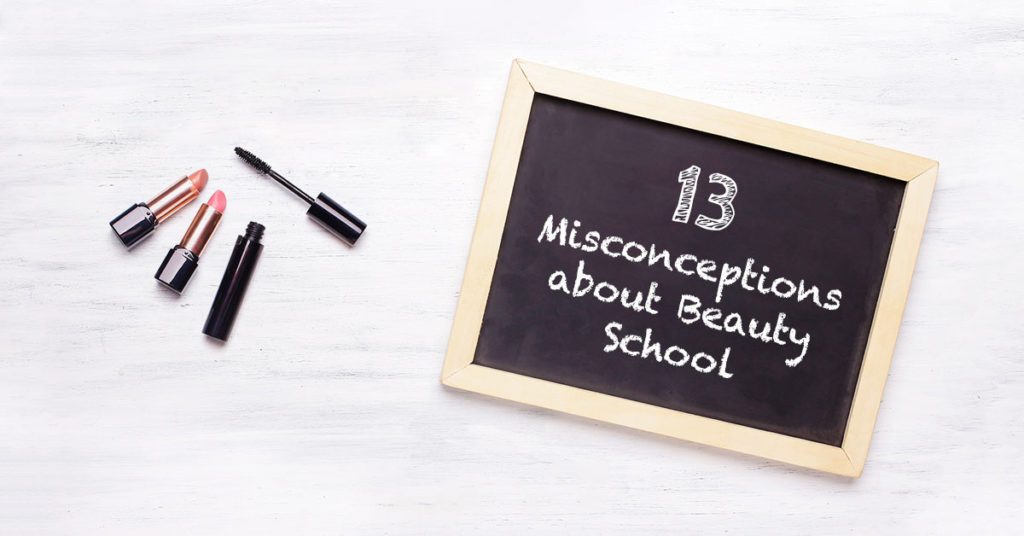
13 Common Misconceptions About Beauty School

Beauty school isn’t for everyone, that’s a fact. Because beauty school may not be as well known or as highly considered as traditional four-year colleges, many on the outside have many misconceptions about beauty school.
These misconceptions, however, are not true.
Here is a list of the 13 most common beauty school misconceptions and why they aren’t true:
- Lack of Financial Aid. If one looks hard enough he or she can find financial aid for beauty school. Many beauty schools themselves offer some sort of financial aid. The costs of attending beauty school can be more than what many think, possibly making the dream of being a beautician out of reach for some students.
- Minimum Age Requirements. Beauty schools get the attention of some students because they accept students as young as 16 while traditional colleges require a minimum of a high school diploma. Not every beauty school has such a low age limit. It is important to research the policies of the beauty school you’re possibly interested in attending first before you apply.
- One License is All You Need. Some think that beauty school students get general training in all aspects of cosmetology from nails to skin to hair and, at the end, are equipped to get their cosmetology certificate and work wherever they want.
While beauty school does equip their students to get cosmetology certification, beauty schools also equip their students in other programs to achieve their respective licenses and certifications such as makeup artistry, microblading, or barbering. - Beauty Schools Aren’t Accredited. Many people outside of the beauty industry may think that working cosmetology or hair is more of a hobby and, as a result, beauty schools aren’t legitimate schools that need to be regulated and accredited. This can’t be further from the truth. If one aspires to one day work in a high-end salon or own their own barber shop, the quality and reputation of the beauty school will play a big role in how successful the start of one’s beauty career will begin. Businesses will only take students who have graduated from an accredited beauty school.
- Limited Career Options. Most people conclude there are limited career opportunities in the beauty industry. The beauty field is full of opportunities as these jobs aren’t ones that can be simply shipped overseas.
- Barber School is Easy. Similar to the view of technical schools, beauty schools have an image of being an easy, cheap and accelerated alternative to traditional college. However, courses in beauty school are very demanding and their conciseness means more information must be learned in a short amount of time.
- The Earnings Potential Is Low. It may be true that you shouldn’t expect to be making $100,000 per year right out of beauty school. Over time though, you’ll get more and more clients, earning more and more. The flexibility and opportunities of the cosmetology fields make for an uncapped earning potential.
- Barbering is Only for Men. Traditionally, only men were barbers (stylists and cutters of men’s hair). Times have changed, however. Just as you’ll find male hairstylists and make-up artists, you’ll find women barbers.
- Only Women Go to Beauty School. This is a stereotypical assumption that has since become outdated. More and more male hairstylists and make-up artists are entering the beauty industry and experiencing great professional success.
- All School Fees Are the Same. This misconception comes from a skewed view of how beauty schools operate. While the class schedule may be shorter, more compact and flexible than courses at traditional colleges, the fee schedule is similar.
For instance, if you were an art major, your art courses will require the additional purchase of art supplies. The fees for an art program is likely more than a business program. Even the textbooks of different programs vary in price.
The same fee discrepancies between programs are found in beauty school. - Beauty Skills Are a Prerequisite. Common thinking goes along the reasoning of “only those who already have beauty skills attend beauty school.” Beauty school is a great option for students with all levels of prior beauty skills and experience. The only way to tell if beauty school is right for you, assess your passion and drive for beauty.
- Beauty School Isn’t Necessary. As many people think cutting hair, applying make-up and painting nails are hobbies and don’t need formal beauty education, beauty school seems unnecessary. As mentioned earlier, barbers, hairdressers, manicurists, pedicurists and cosmetologists need formal training that culminates in licensing and certification. Those looking to start their career in the beauty industry will need to graduate from an accredited beauty school. Not to mention, many states have licensing requirements for jobs related to cosmetology, such as esthetics. For a job like this, finding a job without the required licensing and training would be impossible.
- Beauty School is Only for Young People. Beauty schools accept students with all kinds of backgrounds and demographics, including those of different ages. Older students can be just as successful in their studies and careers as younger students.
Beauty school isn’t for everyone. In fact, it is only for those who have a passion and a drive for beauty. Beauty school is challenging, but the end result will be well worth the time, effort and costs. Contact us today at Taylor Andrews to enroll or learn how our beauty school can help you reach your professional cosmetology goals.